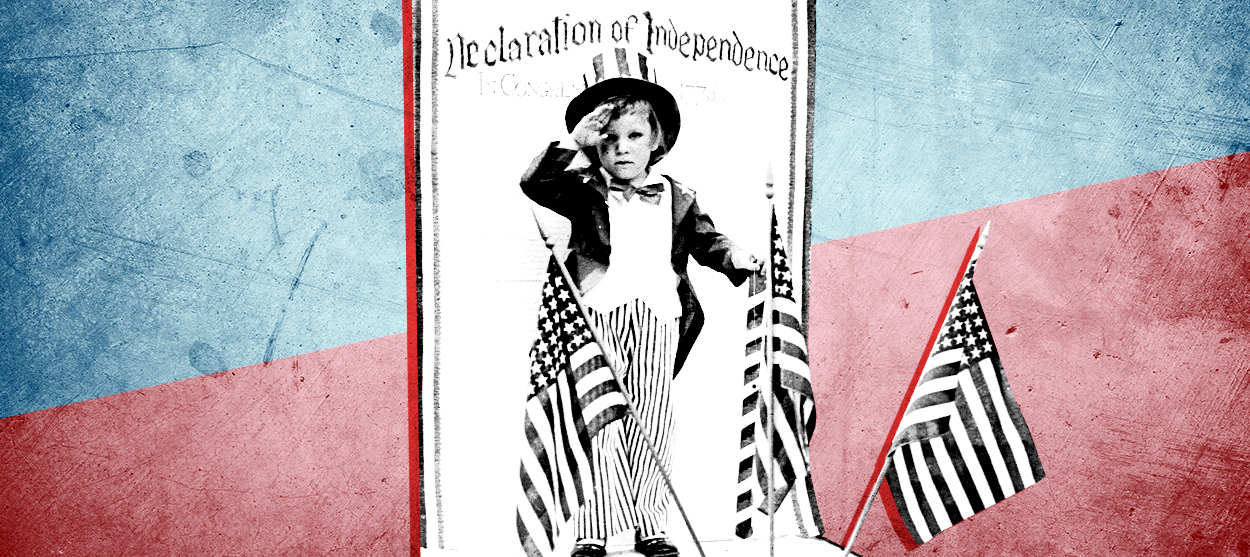It's hard to celebrate the Fourth of July this year
Independence Day 2020 should be more about reflection than fireworks and bunting


A free daily email with the biggest news stories of the day – and the best features from TheWeek.com
You are now subscribed
Your newsletter sign-up was successful
In 1975, PBS aired an episode of the documentary series Bill Moyers Journal called "Rosedale: The Way It Is", about the firebombings of black families' homes in Rosedale, then a predominantly white area of Queens, New York. A disturbing two-minute clip from the documentary — in which a mob of white children and teens verbally and physically abuse a group of Black children who were biking through the neighborhood — went viral after being posted on Twitter last year, prompting The New York Times to seek out those involved. They could find none of the assailants, but they tracked down a dozen of the victims, most of whom are now in their fifties.
As they were on their "bike hike," they told the Times, they saw people gathered beneath an American flag, and, thinking it was a parade, they went over to have a look. "I laugh about it until this day, because it was a parade," said Mark Blagrove, now 57. "To get the Black people out of Rosedale." The children had stumbled into a rally for a white supremacist group then active in the area, and within seconds, they were surrounded and assaulted with racist epithets and stones.
"The American flag is the image when I think about that incident," Renée Lipscomb-McDonald, now 58, said. "That's the symbol that pulled us into that situation, because of the idea that we live in America, the American flag means good things ... They took that beautiful image and turned it into something ugly for me."
The Week
Escape your echo chamber. Get the facts behind the news, plus analysis from multiple perspectives.

Sign up for The Week's Free Newsletters
From our morning news briefing to a weekly Good News Newsletter, get the best of The Week delivered directly to your inbox.
From our morning news briefing to a weekly Good News Newsletter, get the best of The Week delivered directly to your inbox.
On this Fourth of July, I've been thinking about those words, that video, and about how our symbols can mean radically different things to different people. On one side of that Rosedale street, the flag symbolized a place in which non-whites were unwelcome; on the other, it represented aspiration and hope. But as the crowd closed in, the latter meaning collapsed. In that moment, for both groups, there was only one way to interpret the flag.
In post-George Floyd America, with the nation's racist rot exposed to a degree of sunlight not seen in years, Lipscomb-McDonald's disillusionment seems appropriate. The ugly version of America feels unsettlingly present, as does the obvious fact that for the country's people of color, it has always felt that way. Amid the rage and sadness of recent weeks, our rhetoric and our symbols — the soaring eagle, the land of the free — have come to feel like relics, as does the holiday on which those symbols coalesce.
Celebrating Independence Day — really celebrating it — has always necessitated a certain suspension of disbelief: We are asked to wear the colors and wave the flag as if it is V-Day, as if living here can bring us only joy. In some years — and especially for white people like myself, towards whom the American system tilts — this is not so hard to do. But in 2020, the prescribed exuberance feels out of step with our grim reality.
Beyond the treatment of Black Americans, our wayward battle against the coronavirus is another reason to tone down the holiday's usual self-congratulation. July Fourth is built on the assertion that America is the greatest country that Earth has yet produced, and to question this is the wildest heresy. And while there remain countless reasons to celebrate our strengths and victories, our inability to maturely confront a sickness which has killed tens of thousands — and will kill tens of thousands more — should be a source of national shame. Blame whoever you want — at this point, it's largely immaterial — but the fact is that, in the face of a defining crisis, we have embarrassed ourselves. Past generations had war bonds and victory gardens; we have incessant arguments about face coverings and bars.
A free daily email with the biggest news stories of the day – and the best features from TheWeek.com
This is not to minimize the individual sacrifices that have been made since March: millions have lost their livelihoods, 130,000 have died, and we have all been impacted in ways both large and small. And yet, even now, many millions of us can't be bothered to care. It's darkly ironic that on the Fourth of July — which commemorates our self-sufficiency on this side of the Atlantic — Americans cannot visit Europe due to our mishandling of the emergency. We have become a self-sabotaging fortress, and again, our symbols don't match the moment: The Statue of Liberty is an anachronism in a place that seals itself off and shrugs at widespread death.
Recent months have made it impossible to overlook our racism and hubris, two of our most noxious faults. So while Independence Day has traditionally entailed an uncritical embrace of our simplest self-conception, I suggest something else: that we judge how far the gap has grown between that view and what we presently are. Because if we remain convinced that our deepest problems will simply work themselves out — modern America's default attitude — we will never bridge that gap.
The task of making America a place that lives up to its ideals is both massive and nebulous; like climate change — another crisis we do our best to ignore — it might seem too huge to try. But unlike, say, the rapid global lowering of CO₂ emissions, the first step is actually simple: think about other people, and what it might be like to live their lives. Speak to those you wouldn't normally speak to, and listen to what they say. Read about people you wouldn't ordinarily read about. If you happen to be healthy, be respectful of the ill, and if you're young, do the same for the old. It may seem like pie-eyed hippie moralism — and perhaps it is — but it's true nonetheless: Understanding others' lives is the only way that we might begin to restore ourselves.
Renée Lipscomb-McDonald was forever changed by the Rosedale residents who would have scoffed at the notion of speaking to her kindly or of pondering her reality. She is now a social worker, and she told the Times that long-ago day helped nudge her down her path. "My role is to provide hope ... Maybe that's the most significant lesson I got out of that day. That no little girl will ride down the block and ever believe for a second that she's not worthy of respect." Despite the horror she faced, she never abandoned the idea that she could enrich her community.
Perhaps that resiliency — not assorted symbols and colors — is what we should celebrate on this troubled Fourth of July.
Jacob Lambert is the art director of TheWeek.com. He was previously an editor at MAD magazine, and has written and illustrated for The Philadelphia Inquirer, Philadelphia Weekly, and The Millions.
-
 Film reviews: ‘Send Help’ and ‘Private Life’
Film reviews: ‘Send Help’ and ‘Private Life’Feature An office doormat is stranded alone with her awful boss and a frazzled therapist turns amateur murder investigator
-
 Movies to watch in February
Movies to watch in Februarythe week recommends Time travelers, multiverse hoppers and an Iraqi parable highlight this month’s offerings during the depths of winter
-
 ICE’s facial scanning is the tip of the surveillance iceberg
ICE’s facial scanning is the tip of the surveillance icebergIN THE SPOTLIGHT Federal troops are increasingly turning to high-tech tracking tools that push the boundaries of personal privacy
